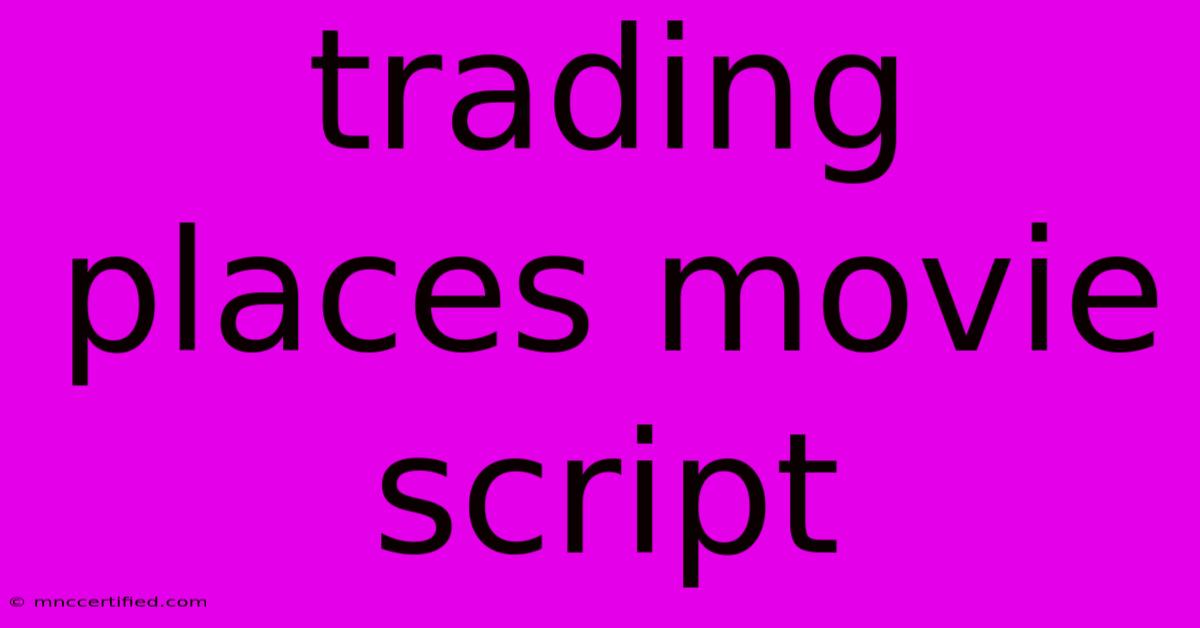Trading Places Movie Script

Table of Contents
Trading Places: A Hilarious Script Deconstructed – Exploring the Comedy Classic's Success
The 1983 film Trading Places isn't just a hilarious comedy; it's a masterclass in witty dialogue, sharp social commentary, and compelling characters. This article delves into the movie script, examining its comedic brilliance, its enduring appeal, and the elements that contributed to its success. We'll explore the script's structure, key scenes, memorable quotes, and the lasting impact it's had on popular culture.
The Genius Behind the Trading Places Script
The screenplay for Trading Places, penned by Timothy Harris and Herschel Weingrod, is a testament to clever writing and sharp observation. It expertly blends slapstick comedy with insightful social satire, creating a film that's both laugh-out-loud funny and thought-provoking. The script's success lies in several key areas:
1. Compelling Characters and their Arcs:
The script brilliantly develops its characters. We witness the transformation of Randolph Duke and Mortimer Duke, from arrogant, wealthy commodities brokers to humbled, albeit slightly wiser, individuals. Similarly, Winthorpe, initially a successful commodities broker, experiences a dramatic downfall before his eventual redemption. Valentine, a street-smart hustler, shows surprising intelligence and resourcefulness, proving her worth beyond her initial appearance. The script's success hinges on the audience’s ability to connect with these characters and their journeys.
2. Witty Dialogue and Memorable Quotes:
Trading Places is filled with memorable lines that have become ingrained in popular culture. From the infamous "It's showtime!" to the biting social commentary woven throughout the dialogue, the script is a treasure trove of quotable moments. The sharp wit and rapid-fire exchanges add to the film's comedic energy, keeping the audience engaged and entertained. This is a prime example of how effective dialogue can elevate a screenplay beyond mere plot points.
3. Intricate Plot and Satisfying Resolution:
The script cleverly weaves together multiple plotlines, culminating in a satisfying and humorous resolution. The elaborate scheme orchestrated against Winthorpe, involving the manipulation of the commodities market and the use of insider information, adds intrigue and suspense. The script's pacing is expertly managed, balancing comedic moments with the drama of the central conflict. The final courtroom scene, in particular, is a masterful blend of comedy and justice.
4. Social Commentary Wrapped in Comedy:
While undeniably funny, the Trading Places script also offers insightful social commentary. It critiques class divisions, corporate greed, and the manipulation of financial markets. The film’s satirical edge adds depth and relevance, making it more than just a simple comedy. This multi-layered approach adds to its enduring appeal and ensures the film remains relevant decades after its release.
The Enduring Legacy of the Trading Places Script
The script's impact extends beyond its initial release. It's influenced numerous films and television shows, and its characters and quotes continue to be referenced in popular culture. Its clever writing and memorable moments have solidified its place as a cinematic classic. The script's success lies in its ability to combine sharp wit, compelling characters, and thought-provoking social commentary into a thoroughly entertaining package.
Finding the Trading Places Script: Resources and Considerations
While finding a readily available, officially licensed script online can be challenging, dedicated script-sharing websites might offer access to fan-made transcripts or unofficially published versions. Always ensure you're respecting copyright laws when accessing and using any script material.
Keywords: Trading Places, movie script, screenplay, Timothy Harris, Herschel Weingrod, comedy, social commentary, Eddie Murphy, Dan Aykroyd, classic film, film analysis, script analysis, memorable quotes, film script, comedy script, 80s movie, movie script analysis
This article incorporates on-page SEO strategies by utilizing keywords strategically throughout the text, using header tags for structure, and employing bold text for emphasis. Off-page SEO strategies would involve promoting this article through social media, relevant forums, and guest blogging on websites related to film analysis and screenwriting.

Thank you for visiting our website wich cover about Trading Places Movie Script. We hope the information provided has been useful to you. Feel free to contact us if you have any questions or need further assistance. See you next time and dont miss to bookmark.
Featured Posts
-
Marbella Fc Atletico Madrid Copa Draw
Dec 10, 2024
-
Tottenham Boss Postecoglous Challenge
Dec 10, 2024
-
Trove Brands Stock Symbol
Dec 10, 2024
-
Luigi Mangione What We Know About The Shooting
Dec 10, 2024
-
Carry Ons Julie Stevens Dead At 87
Dec 10, 2024